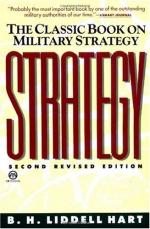
|
| Name: _________________________ | Period: ___________________ |
This test consists of 5 short answer questions, 10 short essay questions, and 1 (of 3) essay topics.
Short Answer Questions
1. In their second war against the Greeks, the massive Persian army and navy that supported it created what strategic problem?
2. One of the aphorisms introduced at the beginning of the book states that all warfare is based on what?
3. Why did the war chief Vitiges decide not to fight Belisarius in Naples?
4. The principle of mobility applies to units on what scale?
5. In the overall strategic planning for the First World War, what country acted as a buffer between Germany and Russia?
Short Essay Questions
1. Describe the changes that took place in France that led to Napoleon becoming ruler of that nation.
2. Why are decisive results important in warfare?
3. What characterized the battles of William of Normandy?
4. What were the results of the Hundred Year's War between England and France?
5. Why is the indirect method favorable over direct methods?
6. What was the overall strategy of Fabius in his war against Hannibal?
7. Describe some of Napoleon's strategies and innovations.
8. What instigated the Byzantine war against the Vandals?
9. What was Caesar's overall strategy in his Mediterranean campaigns?
10. What developments in the period between 1854 and 1914 made it more difficult to employ indirect methods?
Essay Topics
Write an essay for ONE of the following topics:
Essay Topic 1
The western front during the first World War was bloody and generally indecisive. The eventual German retreat was not precipitated by military setbacks, but by mere strategic considerations of position. There is every indication that the war could have continued in its indecisive state for many more years.
Part 1) What nations participated in the war on this front? What were the strategies on both sides? How was the war expected to be fought and won?
Part 2) What difficulties became apparent once the war had begun? How did terrain and technology affect the maneuvers and strategies that could be employed by both sides? In actual practice, what types of strategies were employed during the war?
Part 3) Were the results of the war in this theater decisive or indecisive? What factors contributed to this outcome? How did grand strategy affect the results of the war? Why was Germany eventually forced to retreat and eventually to surrender?
Essay Topic 2
Lines of expectation play a major role throughout the book, helping to explain why various campaigns and offensives were or were not successful. These sometimes obscure or ambiguous concepts can provide a major advantage to the general who is able to best identify and utilize them.
Part 1) What is a line of expectation? How are these lines formed, maintained and identified?
Part 2) What is the importance of lines of expectation in strategy? How should a major natural line of expectation be treated? Can it be engaged directly? Can it ever be safely ignored?
Part 3) Using examples from the book, provide and explain one example each of a general correctly and incorrectly using natural lines of expectation. Explain the results in each case.
Essay Topic 3
The author suggests that the indirect approach is applicable to many fields outside of military strategy. There are obvious similarities between military endeavors, in which the goal is to acquire some lasting benefit for oneself, often in the face of resistance from an outside force, and many other human activities.
Part 1) Explain the indirect approach independent of military strategy. Describe its various components and attributes without reference to military terms or ideas.
Part 2) Discuss how these ideas can be applied to another specific human endeavor. Draw analogies between the military concepts discussed in the book and the concepts that pertain to the endeavor you have chosen to discuss.
Part 3) Use examples to explain how grand strategy relates to this endeavor, and how decisive and indecisive results can be identified.
Part 4) Explain step by step one example of how the indirect approach can be applied to this endeavor in order to bring about decisive results.
|
This section contains 1,039 words (approx. 4 pages at 300 words per page) |

|




